Related Research Articles
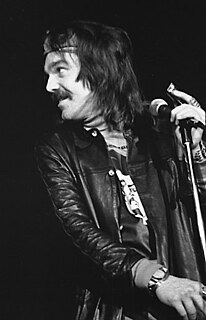
Don Van Vliet was an American singer, songwriter, multi-instrumentalist, and visual artist best known by the stage name Captain Beefheart. Conducting a rotating ensemble called Captain Beefheart and His Magic Band, known separately as "The Magic Band", he recorded 13 studio albums between 1964 and 1982. His music blended elements of blues, free jazz, rock, and avant-garde composition with idiosyncratic rhythms, absurdist wordplay, and his wide vocal range. Known for his enigmatic persona, Beefheart frequently constructed myths about his life and was known to exercise an almost dictatorial control over his supporting musicians. Although he achieved little commercial success, he sustained a cult following as a "highly significant" and "incalculable" influence on an array of new wave, punk, and experimental rock artists.
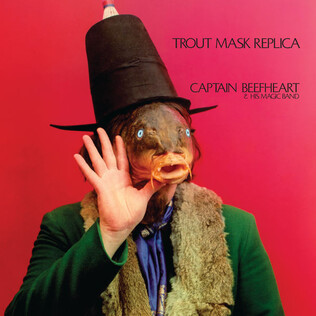
Trout Mask Replica is the third studio album by the American band Captain Beefheart and his Magic Band, released as a double album on June 16, 1969, by Straight Records. The music was composed by Captain Beefheart and arranged by drummer John "Drumbo" French. Combining elements of R&B, garage rock, and blues with free jazz, avant-garde approaches, and other genres of American music, the album is regarded as an important work of experimental music and art rock.

Pork Soda is the third studio album by the American funk metal band Primus, released April 20, 1993, certified Gold in September 1993 and certified Platinum in May 1997. The 2005 re-issue comes in a digipak and contains a booklet with lyrics printed to nine songs, omitting "Pork Soda" which consists of a series of unintelligible rants.

John Stephen French is an American drummer and former member of Captain Beefheart's Magic Band. After various artistic collaborations in his youth he eventually became the principal drummer on several of Beefheart's albums, including 1969's Trout Mask Replica. Beefheart gave him the nickname Drumbo.

Lick My Decals Off, Baby is the fourth studio album by American band Captain Beefheart and the Magic Band, released in December 1970 by Straight and Reprise Records. The follow-up to Trout Mask Replica (1969), it is regarded by some critics and listeners as superior, and was Van Vliet's favorite. Van Vliet said that the title was an encouragement to "get rid of the labels", and to evaluate things according to their merits rather than according to superficial labels.

Bluejeans & Moonbeams is the ninth LP by Captain Beefheart and the Magic Band, originally released in 1974. Despite its uncharacteristically mainstream sound the album failed to chart.

The Spotlight Kid is the sixth studio album by Captain Beefheart. Released in 1972, it is the only album credited solely to Captain Beefheart rather than Captain Beefheart and his Magic Band, although every member features, and it is considered part of the band's repertoire. Often cited as one of the most accessible of Beefheart's albums, it is solidly founded in the blues but also uses instruments such as marimba and jingle bells that are not typical of that genre. The incarnation of the Magic Band on this album was Bill Harkleroad and Elliot Ingber, guitars; Mark Boston, bass; John French, drums; and Art Tripp, marimba. Session drummer Rhys Clark substituted for French on one track, "Glider".

Safe as Milk is the debut studio album by American music group Captain Beefheart and his Magic Band, released in June 1967 by Buddah Records. A heavily blues-influenced work, the album features a 20-year-old Ry Cooder, who played guitar and wrote some of the arrangements.

Mirror Man is the fifth studio album by American band Captain Beefheart and his Magic Band, released in April 1971 by Buddah Records. It contains material that was recorded for the label in 1967 and originally intended for release as part of an abandoned project entitled It Comes to You in a Plain Brown Wrapper. Much of the material from this project was subsequently re-recorded and released through a different label as Strictly Personal (1968). The tapes from the original sessions, however, remained under the care of Buddah, who took four of the unissued tunes and released them as Mirror Man. The album sleeve features an erroneous claim that it had been "recorded one night in Los Angeles in 1965".

The Magic Band was the backing band of American singer, songwriter and multi-instrumentalist Captain Beefheart between 1967 and 1982. The rotating lineup featured dozens of performers, many of whom became known by nicknames given to them by Beefheart. They reformed in 2003, without Beefheart.
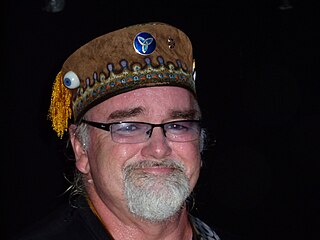
Rockette Morton is an American musician, best known as a bassist and guitarist for Captain Beefheart and the Magic Band in the 1960s and 1970s.
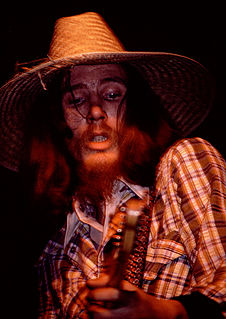
Bill Harkleroad, known professionally as Zoot Horn Rollo, is an American guitarist. He is best known for his work with Captain Beefheart and The Magic Band. In 2003, he was ranked No. 62 in a Rolling Stone magazine list of "the 100 greatest guitarists of all time".
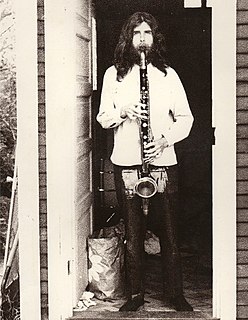
Victor Hayden, also known by his stage name The Mascara Snake, was an American painter and musician.
Jeffrey Ralph Cotton is an American rock guitarist, known for his work as a member of Captain Beefheart's Magic Band. Cotton first came to attention as guitarist with Merrell and the Exiles, who had a few local hits in 1964 in the Los Angeles area. He subsequently joined Blues in a Bottle, which also featured future Magic Band members Mark Boston, Bill Harkleroad and John French. He was recruited into the Magic Band in 1967 as a replacement for Ry Cooder.
Come Out is a 1966 piece by American composer Steve Reich. Reich was asked to edit down tape footage into a form of collage for a benefit for the Harlem Six and Come Out was a byproduct of the collage's production. The Harlem Six were six black youths arrested for a murder of Margit Sugar, a Hungarian refugee, in Harlem in the weeks following the Little Fruit Stand Riot of 1964. Only one of the six was responsible while the lead witness is generally considered the actual perpetrator. Truman Nelson, a civil rights activist and New Yorker who had asked Reich to compose a sound collage that was separate from Come Out, gave him a collection of tapes with recorded voices to use as source material. Nelson agreed to give Reich creative freedom with the tapes that he presented him for the sound collage. Come Out was a loop of four seconds from the more than 71 hours of tapes Nelson presented to Reich.
"Moonlight in Vermont" is a popular song about the U.S. state of Vermont, written by John Blackburn (lyrics) and Karl Suessdorf (music) and published in 1944. It was introduced by Margaret Whiting in a 1944 recording.
Gary "Magic" Marker was an American bass guitarist and recording engineer, best known for his involvement in various psychedelic rock bands of the 1960s.
Moris Tepper, sometimes credited as Jeff Moris Tepper, is an American singer-songwriter, guitarist and artist.

I'm Going to Do What I Wanna Do is a live album from Captain Beefheart and the Magic Band. In support of the US release of his album Shiny Beast , Beefheart and the band undertook a promotional club tour. On Saturday 18 November 1978 they performed at My Father's Place in Roslyn, New York. My Father's Place was located under a motorway bridge, held about 200 people and the patrons sat at long tables and could dine whilst listening if they wished. The show was recorded and mixed directly to two-track tape. Rhino Records made the album available for download, after a limited release on CD.

"Electricity" is a song by Captain Beefheart and his Magic Band on the 1967 album Safe as Milk. Beefheart claimed the label he and his band were signed to, A&M Records, dropped them after co-owner Jerry Moss heard the song and declared it "too negative" for his teenage daughter to listen to. Beefheart's vocals, while recording the final version for the album, shattered the microphone.
References
- 1 2 "Top 10 Captain Beefheart Songs".
- ↑ Captain Beefheart: Under Review. Music Video Distributors. 2006.
- ↑ "Moonlight on Vermont - Captain Beefheart & the Magic Band | Song Info | AllMusic". AllMusic .
- ↑ Linhardt, Alex. "Captain Beefheart: I'm Going to Do What I Wanna Do". pitchfork.com. Retrieved 21 December 2018.
- ↑ "Ten Essential Captain Beefheart Songs". Rolling Stone . 20 December 2010.
- ↑ ""A 20th Century Visionary" - Liverpool prepares to celebrate Captain Beefheart". 26 October 2017.
- ↑ "The 10 best Captain Beefheart Songs". 15 June 2020.